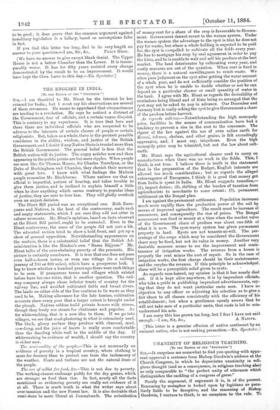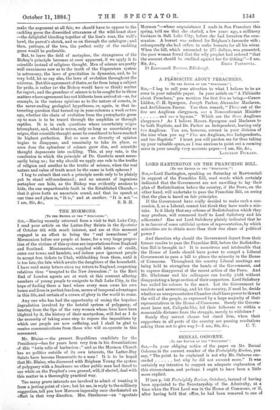UNANIMITY OF RELIGIOUS TEACHING. [To THE EDITOR OF THE "SPECTATOR.")
SIR,—It surprises me somewhat to find you quoting with appa- rent approval a sentence from Bishop Goodwin's address at the Church Congress, in which he depreciates unanimity in reli- gious thought (and as a consequence, in religions teaching also) as only comparable to "the perfect unity of utterance which distinguishes the cackling of a congress of geese."
Surely the argument, if argument it is, is of the poorest. Reasoning by metaphor is looked upon by logicians as pecu- liarly liable to be deceptive, and the reasoning of Bishop Goodwin, I venture to think, is no exceptaon to the rule. To
make the argument at all fair, we should have to oppose to the cackling geese the diversified utterances of the wild-beast show —the delightful blending together of the lion's roar, the wolf's howl, the parrot's shriek, and so on through the catalogue ; and then, perhaps, of the two, the perfect unity of the cackling geese would be preferable.
But, to leave the field of metaphor, the strangeness of the Bishop's principle becomes at once apparent, if we apply it to scientific instead of religious thought. Men of science are pretty well unanimous now as to the truth of the Copernican system in astronomy, the laws of gravitation in dynamics, and, to be very bold, let us say also, the laws of evolution throughout the universe. But this agreement of theirs, so far from being a subject for pride, is rather (so the Bishop would have us think) matter for regret; and the grandeur of science is to be sought for in those matters where agreement has not hitherto been arrived at—as, for example, in the various opinions as to the nature of comets, in the never-ending geological hypotheses, or, again, in that in- teresting question that turned-up in your columns a week or two ago, whether the chain of evolution from the protoplastic germ up to man is to be traced through the amphibia or through reptiles. It is in such questions where uncertainty reigns triumphant, and, what is worse, only so long as uncertainty so reigns, that scientific thought must be considered to have reached its highest perfection. But as soon as diversity of opinion begins to disappear, and unanimity to take its place, so soon does the splendour of science grow dim, and scientific thought degenerate into cackling. This, at any rate, is the conclusion to which the principle of Dr. Goodwin must neces- sarily bring us ; for why should we apply one rule to the truths of religion and another to the truths of science, when the real natnre and value of truth must be the same in both spheres ?
I beg to submit that such a principle needs only to be plainly put to stand self-condemned ; and no amount of ingenious metaphor can hide, as the Bishop was evidently anxious to hide, the one unpardonable fault in the Established Church,— that it gives forth an uncertain sound, and that its speech at one time and place is, "It is," and at another, "It is not."—



































 Previous page
Previous page